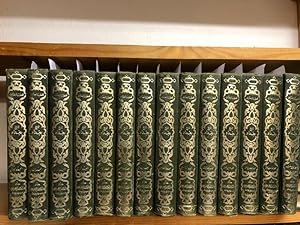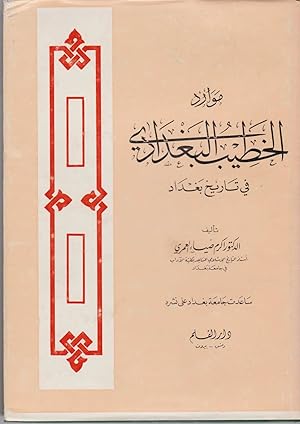tarikh baghdad die von al (3 Ergebnisse)
Produktart
- Alle Produktarten
- Bücher (3)
- Magazine & Zeitschriften
- Comics
- Noten
- Kunst, Grafik & Poster
- Fotografien
- Karten
-
Manuskripte &
Papierantiquitäten
Zustand
- Alle
- Neu
- Antiquarisch/Gebraucht
Einband
- alle Einbände
- Hardcover
- Softcover
Weitere Eigenschaften
- Erstausgabe (1)
- Signiert
- Schutzumschlag (2)
- Angebotsfoto
Land des Verkäufers
Verkäuferbewertung
-
Tarikh Baghdad. Die Geschichte von Bagdad. The History of Baghdad.
Verlag: Beirut: Dar el Kitab al Arabi, 1967
Anbieter: Fundus-Online GbR Borkert Schwarz Zerfaß, Berlin, Deutschland
Buch
Leinen/cloth. Zustand: Gut. 14 Bände / volumes. 441,432,479,476,511,424,484,524,512,496,507,524,512,472 S./p. Aus der Bibliothek von Prof. Dr. Albrecht Noth (1937-1999), langjährigem Professor für Geschichte und Kultur des Vorderen Orients in Bonn und Hamburg. Text arabisch. Altersgemäß sehr gut erhalten, einzelne Eselsohren. Abu Bakr Ahmad ibn Ali, genannt al-Chatib al-Bagdadi ("der Freitagsprediger von Bagdad", 1002-1071), war ein muslimischer, speziell hanbalitischer Hadithgelehrter und Historiker. Sein Hauptwerk ist das Ta'rih Bagdad madinat as-salam, eine auf Hadith-Grundlage geschriebene, als biographisches Nachschlagewerk zu über 8000 Theologen, Dichtern, Juristen und Literaten konzipierte "Geschichte Bagdads, der Stadt des Friedens" samt umfangreicher topographischer Einleitung. Die vorliegende Ausgabe ist ein Nachdruck der 1931 in Kairo erschienenen Edition. / From the library of Prof. Dr. Albrecht Noth (1937-1999), long-time professor for the history and culture of the Near East in Bonn and Hamburg. In very good condition, some dog-ears. Abu Bakr Ahmad ibn Ali, known as al-Khatib al-Baghdadi ("the Friday preacher from Baghdad", 1002-1071), was a Muslim, Hanbalite hadith scholar and historian. His main work is the Ta'rikh Baghdad madinat as-salam, a hadith-based "History of Baghdad, the city of peace", written as a biographical encyclopedia to more than 8000 theologians, poets, jurists and intellectuals with a substantial topographical introduction. The present edition is a reprint of the 1931 edition from Cairo. ar Gewicht in Gramm: 550.
-
Mawarid Al-khatib Al-Baghdadi fi Kitab "Tarikh Baghdad". Study on the Sources of Kitab "Tarikh Baghdad" of AL-Khatib Al-Baghdadi.
Verlag: Damaskus: Dar al-Qalam, 1975
Anbieter: Fundus-Online GbR Borkert Schwarz Zerfaß, Berlin, Deutschland
Buch
Zustand: Gut. 636 S./p. Aus der Bibliothek von Prof. Dr. Albrecht Noth (1937-1999), langjährigem Professor für Geschichte und Kultur des Vorderen Orients in Bonn und Hamburg. Text arabisch. - Schutzumschlag eingerissen und verschmutzt, sonst gut. - Akram Dia'a Al-Umari (b. 1942) ist Prof. für Islamische Geschichte. / From the library of Prof. Dr. Albrecht Noth (1937-1999), long-time professor for the history and culture of the Near East in Bonn and Hamburg. Arabic text. - Dust jacket torn and dirty, otherwise good. - Akram Dia'a Al-Umari (b. 1942) is a professor for Islamic history. ar Gewicht in Gramm: 550 Leinen mit Golddruck, Schutzumschlag / Linnen with gold imprint, jacket.
-
[THE CITY OF PEACE: COMPLETE "BAGHDAD" AS THE MOST INFLUENTIAL WORK OF THE ISLAMIC RENAISSANCE] Târîkh Bagdâd aw medînet al-salâm: Wad'uhu fî azhâ 'usûr al-Islâm mundu ta'sîsihâ ilâ wafâtihi 'âm 463 h. 8. Edited by Mohammad Amîn al-Hanjî. [i.e. History of Baghdad or the city of peace]. 14 volumes set.
Verlag: Maktabat al-Hangî / Matbaa al-Saade., [AH 1349], Al-Qahira / Egypt, 1931
Anbieter: Khalkedon Rare Books, IOBA, Istanbul, Türkei
Buch Erstausgabe
Leather. Zustand: Very Good. 1st Edition. Original brown half leather bindings in Egyptian style, raised six bands to spine, title gilt on the second, volume nos on fourth, and alphabetical with the historical content of the volumes on sixth compartments and "Mahmoud Al-Tawawî" name. Minor foxing on some pages. Overall a very good set. Roy. 8vo. (24 x 17 cm). In Arabic. 14 books are complete set in 7 volumes. Extremely rare first printed edition of the most comprehensive and complete corpus on Baghdad city, which includes Al-Baghdadi's first-hand account of the collection of hadiths, biographies, and his travels in the 11th century Baghdad in traditional "al-râwî" style. Al-Baghdadi is known as a Muslim traveler in the pursuit of knowledge who compiled hadiths and traveled to many Islamic cities. He was born on the 24th ?jumada II, 392 (1002) at Darzidjan, a large village on the west bank of the Tigris below Baghdad. The son of a khatib [i.e. preacher], he began his studies very early and spent his youth traveling in search of ?adith. In this way, he visited Basra, Nishapur, I?fahân, Hamadân, and Damascus. Finally settling in Baghdâd, he held the office of a kha?îb and this was the origin of the name al-Khatîb al-Bag?dadi. After completing his education, he spent more than twenty years of his time writing "Tarikh Baghdad". He finished his corpus in 444 AH [1052-53]. He was a fellow student of Rîsürrüesâ Ibn al-Muslima who was the vizier of the Abbasid caliph Kâim-Biemrillâh. The vizier took Khatib, whom he appreciated in the science of hadith, under his patronage. The Abbasid caliph, therefore, ordered Khatib to be given permission to take hadith lessons from him. Khatib started to narrate hadiths from "Tarikh Baghdad" to his students here in his house near the Nizâmiya Madrasa, on the other hand, he started to read the books for which he had permission to narrate from many teachers, also write the books he planned. Several years after, the Turkish commander Besasiri (?-1060), who was a supporter of the Fatimid Caliph Mustansir-Billâh, entered Baghdad with the encouragement of the Fatimid caliph, deposed the caliph, and killed Ibn al-Muslima. Some members of the Hanbali sect, who had a grudge against Khatib because of what they wrote against some Hanbalis in Tarikh Baghdad, started to disturb him by taking the opportunity to kill the vizier. Therefore, he had to flee to Damascus. In his masterpiece, Khatibi, in addition to his account and descriptions of the city during his time in Baghdad, 7831 figures of people in total who lived or came in Baghdad before 450 (1058), statesmen such as caliphs, viziers, commanders, poets, judges, and other professions. This is an alphabetical work giving information about biographies of these figures, but it starts with the name "Muhammad" referring to the Muslim prophet. The first volume is about the establishment of Baghdad in the pre-Islamic period, its conquest by the Muslims, and its history. This masterpiece of him, published in fourteen volumes, is the most comprehensive corpus written on Baghdad in the Islamic world including the city's topography, history, et alli. Brockelmann, GAL, I, 401; Suppl., I, 563.; H. Gibb, "Islamic Biographical Literature".; F. Rosenthal, A History of Muslim Historiography, Leiden 1968, p. 14, 43. Only one set in OCLC in BnF (Bibliothèque nationale de France): 1198963531.




![Bild des Verkäufers für [THE CITY OF PEACE: COMPLETE "BAGHDAD" AS THE MOST INFLUENTIAL WORK OF THE ISLAMIC RENAISSANCE] Târîkh Bagdâd aw medînet al-salâm: Wad'uhu fî azhâ 'usûr al-Islâm mundu ta'sîsihâ ilâ wafâtihi 'âm 463 h. 8. Edited by Mohammad Amîn al-Hanjî. [i.e. History of Baghdad or the city of peace]. 14 volumes set. zum Verkauf von Khalkedon Rare Books, IOBA](https://pictures.abebooks.com/inventory/md/md31166831974.jpg)